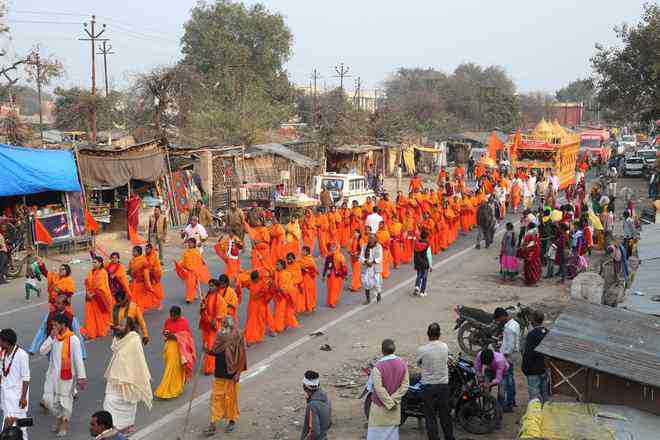
Unholy presence: The book also has chapters on the increasing influence of godmen
Sandeep Sinha
Ravish Kumar ‘s book, The Free Voice — On Democracy, Culture and the Nation, highlights the state of the nation, investigating the threat to free expression and how the fear of institutional, physical and psychological violence is being used to replace debate, dialogue and social harmony, infusing instead intolerance and hate. It has been translated from Hindi by Chitra Padmanabhan, Anurag Basnet and Ravi Singh.
There are some over-riding themes in the book. First is the atmosphere of fear that, the author says, has crept into the psyche of the people. Ravish Kumar mentions the death of Judge BH Loya who was presiding over the Sohrabuddin Sheikh encounter case in a CBI court. His wife and son are unable to summon up the courage to speak their minds. Isn’t democracy about the freedom to voice a different opinion and right to dissent? But fear of the authority prevents this and the author finds this stifling, feeling that there is a ‘national project’ of instilling fear, deriving strength from social media.
He points out the role that the IT cell of various parties plays. Through its own laboratory, the ‘WhatsApp University’, the IT cell has transformed the media into “godi” media (lapdog media). The social media is being used to disseminate fake news and gather mobs to carry out the agenda of fringe elements who swear in the name of mainstream politics.
Fake news is of concern to the author. Ravish Kumar gives the example of Prime Minister Narendra Modi distorting facts at an election rally in Gujarat to say that Pakistan sympathisers had met at the house of Mani Shankar Aiyyar to make Ahmed Patel the Gujarat CM. It was a brazen attempt at communal polarisation. Modi’s fake news deed in Gujarat has now been emulated by Congress president Rahul Gandhi. He has alleged that the Narendra Modi app is leaking user data to a third-party, a US company, without the consent of the users.
The author gives numerous examples to show how news gets distorted — the statement attributed to actor Aamir Khan about feeling unsafe in India, the reaction by actor Paresh Rawal to a statement attributed to Arundhati Roy about the Army action in Kashmir that eventually turned out to be untrue and the row over the film Padmaavat. Fake news fans the flame and the mob then acts to silence a dissenting voice as in the case of journalist Gauri Lankesh.
The problem of fake news has been corroborated by Pratik Sinha of Altnews.in who said journalists have done away with objectivity, accuracy, field work and cross-checking of facts. According to Sinha, there are three types of stories that go viral depending on how provocative these stories are — speeches by politicians, certain stories by the mainstream media and those with communal messages involving Hindu-Muslim binaries. Also, while mobile penetration has increased the source of information, people are unable to check their veracity.
Ravish is also concerned about the presence of lawyers in cases of intimidation of journalists and describes them as ‘legal empowerment cell’ for the mob. He says that in this kind of atmosphere, only the “godi media” is safe. The author also disapproves of the tendency to falsify history, citing the example of Netaji Subhas Chandra Bose files being exhumed from the archives to give the impression that he had been denied his rightful place in history and also the efforts to run down Jawaharlal Nehru. He mentions the bellicose TV debates that create rancour and emphasises that the people owe it to themselves to rebuild democratic consciousness. We have to understand what it means to be the people, he says.
The book also has chapters on the increasing influence of godmen, how our cities should not only be eco-friendly but ishq-friendly too and whether we have understood the true meaning of independence even 70 years after gaining freedom.
The author is criticised for directing his indignation at the saffron set-up. While his ire may appear to be targeted at a particular party, the stance is natural for somebody who revels in being anti-establishment. Did not journalists stick their neck out while criticising Indira Gandhi during the Emergency and even otherwise?
A journalist is not supposed to be a fence-sitter; he is supposed to take sides. Irrespective of whether one agrees with his views or not, it cannot be denied that Ravish Kumar excels in his pursuit as a journalist. The lines from Hindi poet Ramdhari Singh Dinkar sum up his endeavour: “Samar sesh hai nahin paap ka bhagi kewal vyaghra, jo tatastha hai samay likhega unka bhi apradh.” (It is not the evil-doer alone who is to blame for the ills, all those who are indifferent are equally sinned).



























